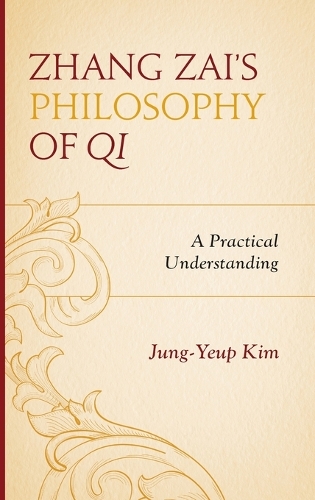
Zhang Zai's Philosophy of Qi: A Practical Understanding
(Hardback)
Publishing Details
Zhang Zai's Philosophy of Qi: A Practical Understanding
By (Author) Jung-Yeup Kim
Bloomsbury Publishing PLC
Lexington Books
6th March 2015
United States
Classifications
Tertiary Education
Non Fiction
Taoism
181.114
Physical Properties
Hardback
132
Width 162mm, Height 238mm, Spine 16mm
331g
Description
Qi (vital energy) is one of the most important concepts in Chinese philosophy and culture, and neo-Confucian Zhang Zai (1020-1077) plays a pivotal role in developing the notion. An investigation of his philosophy of qi is not confined to his particularity, but sheds light upon the notion of qi as it is understood within Chinese and East Asian thought in general. Yet, his position has not been given a thorough philosophical analysis in contemporary times. The purpose of this book is to provide a thorough and proper understanding of Zhang Zais philosophy of qi. Zhang Zais Philosophy of Qi: A Practical Understanding focuses on the practical argument underlying Zhang Zais development of qi that emphasizes the endeavor to create meaningful coherence amongst our differences through mutual communication and transformation. In addition to this, the book compares and engages Zhang Zais philosophy of qi with John Deweys philosophy of aesthetic experience in order to make Zhang Zais position more plausible and relevant to the contemporary Western audience.
Reviews
The book offers some fresh interpretative (and translational) perspectives on the Zhngmeng and Zhangs thought. * Religious Studies Review *
Kim Jung-Yeups book (based on the authors Ph.D. thesis) brings a refreshing and innovative understanding of Zhang Zais philosophy of qi as a dynamic pluralism of the human experience. This new interpretation challenges the accepted substance-monistic and materialistic understandings. Kims new voice is a longed-for necessity. . . . Kim brings back to the front the significance of morality, too often neglected with regard to Neo-Confucianism. * Dao: A Journal of Comparative Philosophy *
There is no concept more fundamental to Chinese cosmology generally than qi, and yet there is no term more persistently misunderstood. In Zhang Zai's Philosophy of Qi: A Practical Understanding, Jung-Yeup Kim uses a close revisonist reading of Zhang Zai to challenge the standard monistic interpretations of a putative homogenous ontology with a dynamic organic pluralism that not only accounts for both the continuity and complexity of the content of the human experience, but also for the capacity of human beings to optimize the creative possibilities of this experience to live significant lives. -- Roger T. Ames, University of Hawai'i
This illuminating and creative work builds upon current scholarships of Zhang Zai's philosophy and the variety study of qi, and arrives with refreshing and innovative ways to construct Zhang Zais vertical and horizontal development of qi, rigorously unfolding a few debatable philosophical issues in a Neo-Confucian period. This book will offer a new impulse for fruitfully navigating Chinese and comparative philosophy and a deeper understanding of polarity, correlativity, and organic unity of qi. It is a timely and valuable contribution to the field. -- Robin R. Wang, Loyola Marymount University
Author Bio
Jung-Yeup Kim is assistant professor of philosophy at Kent State University.
